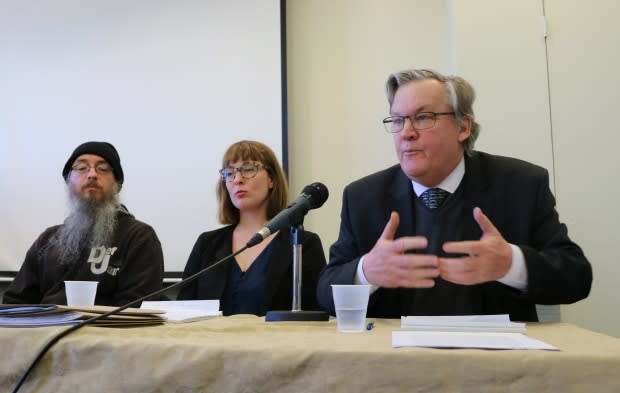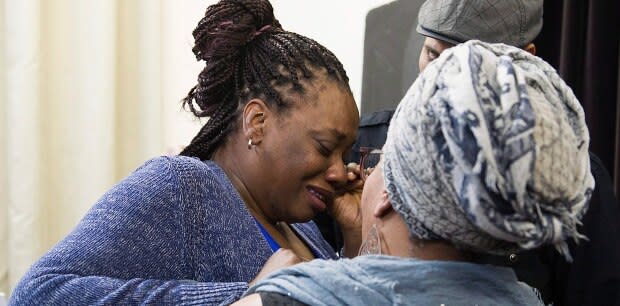Government pressed to pay for family's lawyer at inquest into death of Pierre Coriolan
The family of Pierre Coriolan is still trying to find out if it will receive funding to pay for lawyers at the coroner's inquest into his death.
Police shot and killed Coriolan in the hallway outside his apartment on June 27, 2017, in Montreal's Gay Village.
He suffered from mental health problems.
For now, Virginie Dufresne-Lemire, the family's lawyer, is working pro bono. But she said there's only so much time she can commit if she isn't compensated, and the case is complex.
Dufresne-Lemire and her law partner, Alain Arsenault, received hundreds of pages of documents related to the case last Friday, ahead of the Feb. 17 inquest.
The police officers involved all have legal representation and much of it is paid by taxpayers, either through the City of Montreal or the police department.
"It is very important that someone defend the victim," she said at a news conference Thursday.
"The police will testify and we have to challenge their story and make sure we have the right evaluation of the situation."
Lessons from Fredy Villanueva
In 2013, the Quebec government adopted a law allowing financial assistance for victims, if necessary, during inquests into police killings, following criticism over the inquest into the death of Fredy Villanueva.
Villanueva, 18, was shot by police in 2008.
The coroner in that case suspended the inquest, in part, over concerns that not all interested parties had access to legal representation.
But the province never put the change into practice. Dufresne-Lemire and Arseneault want the government to move swiftly to do so now. They first made the request in a letter last fall.
In an email, a spokesperson for Andrée Laforest, Quebec's acting minister of public security, would only say the government is considering the request.

Coriolan's two sisters and two daughters were granted standing at the inquest, which means they or their lawyers can intervene and ask questions.
But it can be difficult, even traumatic, for a family member to demand answers from the police officers who killed their loved one, said Alexandre Popovic, a longtime activist with the Coalition Against Repression and Police Abuse.
"Not everybody is capable of doing something so demanding emotionally, psychologically. Sometimes family members cannot even attend the inquest because they know it will be too much for them," he said.
Quebec's Crown prosecutors' office decided last year not to lay charges against police, saying the officers had acted in accordance with the law.
Officers were responding to complaints that Coriolan was smashing things and yelling in his apartment.

Coriolan was approaching police with a screwdriver in one hand and a knife in the other when he was shot by two officers, according to the Crown.
Police had unsuccessfully tried to neutralize Coriolan using a Taser — which didn't properly discharge — and plastic bullets, before using their guns.
Six officers were involved in the intervention.
A toxicological analysis showed that Coriolan had a high level of psychotropic substances in his blood, and he had a history of mental illness.
Coriolan's family has filed a lawsuit against the city alleging that police were abusive and used unnecessary force.


